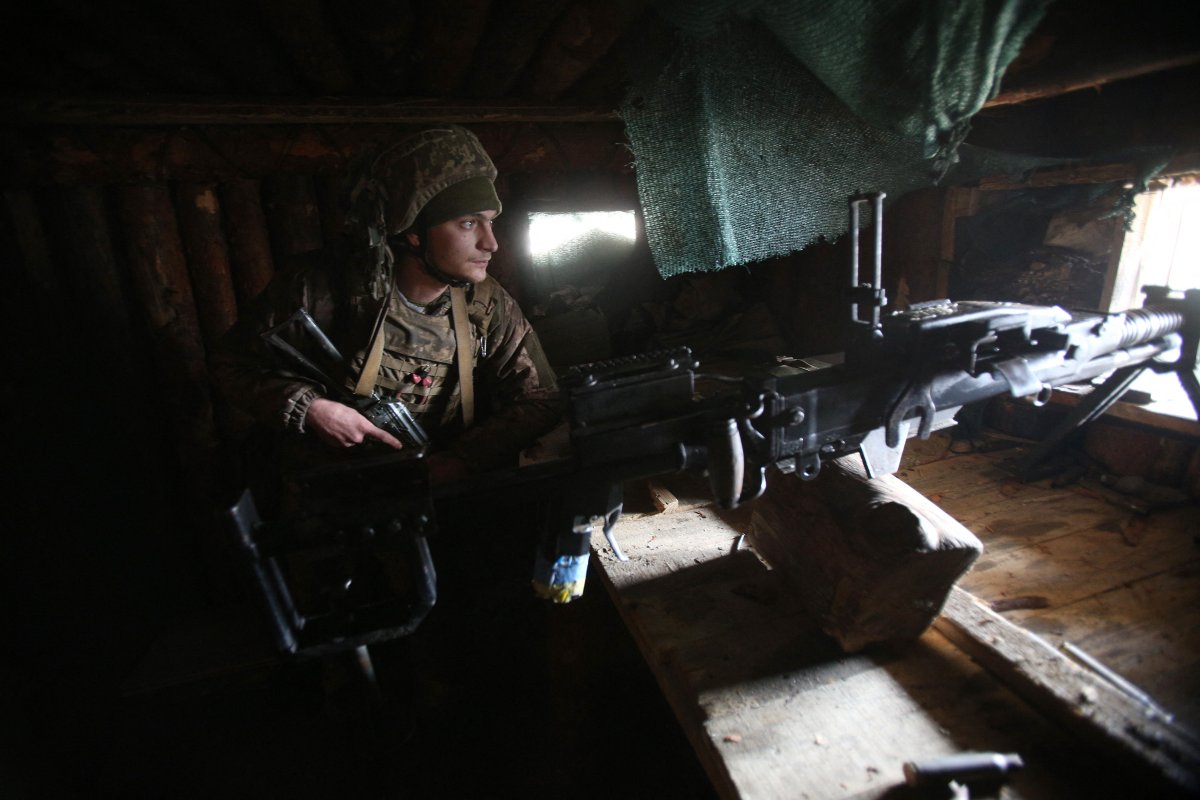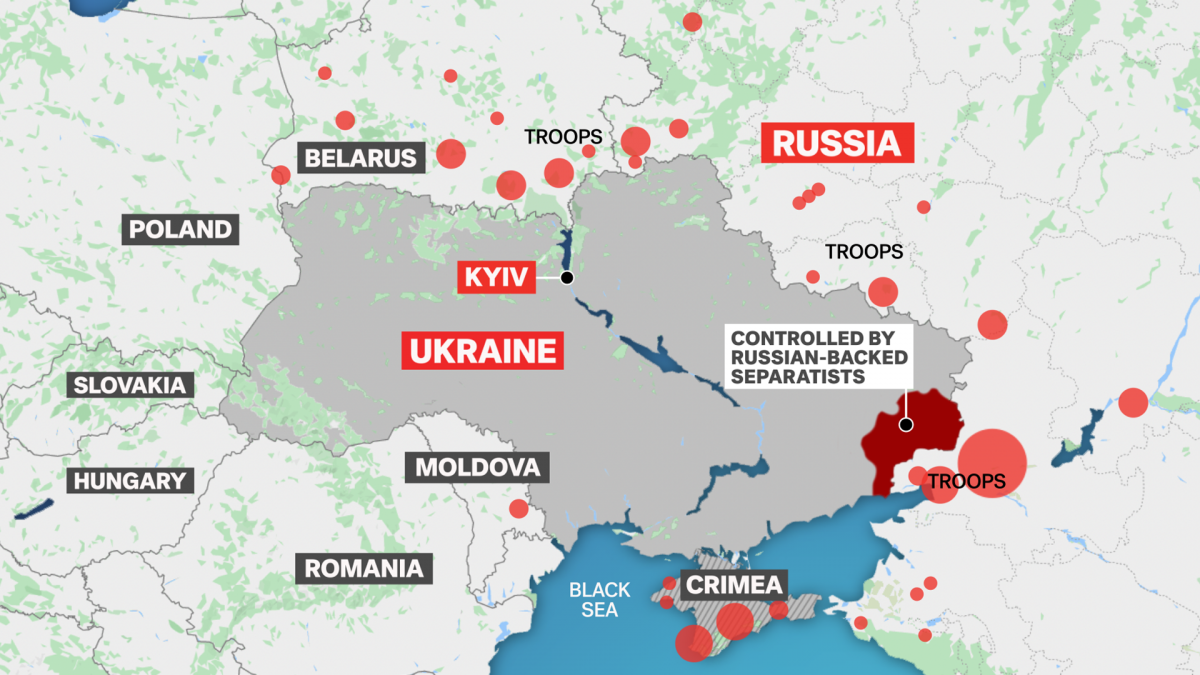President Joe Biden's administration has informed Ukrainian President Volodymyr Zelenskyy of intelligence assessing that Russia is preparing to conduct a full-scale invasion of the neighboring country within the next 48 hours, U.S. intelligence officials have revealed to Newsweek.
"The President of Ukraine has been warned Russia will highly likely begin an invasion within 48 hours based on U.S. intelligence," a U.S. official with direct knowledge told Newsweek.
"Additionally," the U.S. official added, "reporting from aircraft observers indicates Russia violated Ukrainian airspace earlier today, flying possible reconnaissance aircraft for a short period over Ukraine."
A source close to Zelenskyy's government also confirmed to Newsweek that such a warning was received, but noted that this was the third time in a month Kyiv was told to prepare for imminent large-scale military action by Russian President Vladimir Putin.
"It's possible for sure," the source said. "Putin can't keep so many troops in the field much longer."
The Pentagon's assessment includes Russian airstrikes, cruise missiles and a ground invasion, according to the U.S. intelligence official.
The information was confirmed by a second U.S. intelligence official, who emphasized the comprehensive nature of the military operation the Pentagon anticipated from Russia.
The official told Newsweek that the invasion will include not only a push from the pro-Moscow rebel-held Donbas region in the east, where additional Russian units termed "peacekeepers" by Moscow were sent Monday, but also a major thrust toward the capital Kyiv from the northern border with Belarus, where Russian troops recently extended joint exercises with their ally.
The second U.S. official said that the operation would begin with a cyber attack, followed by a ground invasion that would likely occur at night. Both officials maintained, however, that Russia's plans could change based on daily developments.
Another source who took part in a National Security Council call on Tuesday confirmed to Newsweek that the White House was "incredibly pessimistic" about this being limited to the Russia-endorsed rebel republics and that an invasion would likely occur in 24-48 hours.
Newsweek has reached out to the White House, Pentagon and Russian embassy in Washington for comment.

Asked about what such a massive Russian intervention could look like in terms of military operations, the second U.S. intelligence official with whom Newsweek spoke pointed to a recent article in Foreign Affairs penned by CNA think tank's Russia Studies Program Director Michael Kofman and research scientist Jeffrey Edmonds.
Newsweek contacted Kofman, who then provided a hypothetical play-by-play of what he called "the worst-case scenario" should Moscow actually go through with the alleged plans.
"It will open with airstrikes and missile strikes heavily supported by or enabled by cyber warfare and electronic warfare capabilities rapidly shifting to a combined arms ground offensive," Kofman told Newsweek. "And the offensive itself will be a multi-axis attack across the border from Belarus from the north all the way to Crimea in the south."
And he said such an offensive would have "clear objectives," the first of which would be a two-part plan to besiege major northern and northeastern Ukrainian cities through "first, a pincer movement to encircle Kyiv to impose regime change in the country," and "second, a much larger pincer movement from Ukraine's northeast, this is principally the Kharkiv area but not just Kharkiv, using a concentration of Russian forces from Kursk to Belgorod down to Millerovo."
The second Russian objective Kofman outlined would be "to operationally encircle the bulk of Ukraine's forces currently deployed in the Joint Forces Operation, which is a substantial percentage of Ukrainian ground forces, deployed near the line of control in the Donbas." Then, Kofman said, "the Russian forces will attempt a large pincer movement from the east and from Crimea to the south to envelop Ukrainian units in the JFO to cut them off from ground lines of communication, prevent their potential retreat or an organized retreat to the Dnieper River."
What Russian forces will seek, according to Kofman, would be "a quick initial campaign whereby they are able to isolate the capital and the political leadership from around the country and, at the same time, isolate Ukrainian forces and break them up into different pockets or groupings of encircled troops in order to attain a surrender."
And while he said "it's not clear that Russia intends a prolonged occupation" of Ukraine, he pointed out that "all the evidence suggests that they plan for it." Signs he referenced include Russia's deployment of auxiliary and national guard units to frontier regions.
Kofman also pointed out that though Russian troops "likely intend to occupy some parts of Ukraine for an extended period of time," this did not necessarily or even likely mean the entirety of Ukraine, the largest country in Europe and a neighbor of NATO nations Poland, Slovakia, Hungary and Romania to the west.
As for Ukraine's capability to counter an initial invasion, Kofman was skeptical that the Ukrainian armed forces, even beefed up with some Western military assistance and hardened by eight years of clashes with Donbas separatists, were prepared for a larger conflict with its far more powerful neighbor.
"It is an understaffed force without experience in maneuver warfare, and major structural deficiencies in things ranging from logistics to availability, air defense and the like," Kofman said. "It is a military that is well-prepared for a limited fight in the Donbas and is rather unprepared for this kind of war."
Kofman estimated Russia's military power to outweigh Ukraine's at least 3 to 1, with additional force multipliers that give Moscow an even "much higher advantage." He also felt Ukrainian troops trained to fight in command and control-led formations would be hard-pressed to abruptly transition to guerilla warfare-like techniques in the midst of the battle.
Shortly after Newsweek was made aware of the U.S. assessment, the websites for Ukraine's Defense Ministry, Foreign Ministry and other institutions abruptly went offline in what signaled a potential sweeping cyber attack, which would add to a series of apparent cyber assaults that the White House has publicly blamed on Moscow.
Newsweek also reported Monday after obtaining an FBI document that U.S. law enforcement has warned the U.S. private sector of a heightened potential of Russian state-sponsored cyber attacks against the United States.
Moscow has denied engaging in any hostile cyber activity and has accused Washington of exaggerating the likelihood of a conflict erupting over Ukraine, which has been at war for eight years with two Russia-aligned breakaway republics in Donbas. The self-proclaimed states were granted recognition Monday by Putin in a move the Russian leader argued was necessary to protect them from Ukrainian aggression.
No country has yet followed suit, and U.S. and Ukrainian officials have rejected the move as part of a pre-orchestrated plot to justify the deployment of Russian troops into the insurgent region and a potential larger-scale effort toward operations in other parts of Ukraine.

The U.S. has been warning for weeks that Russia was in a position to conduct an invasion at any time amid an unprecedented military buildup near Ukraine's borders, and Biden said Friday that he was "convinced" Putin had already made the decision to do so, though he noted "diplomacy is always a possibility."
But after Monday's events, the State Department and White House signaled that "in-principle" meetings scheduled between Secretary of State Antony Blinken and Russian Foreign Minister Sergey Lavrov, as well as between Biden and Putin, were no longer on the agenda.
In the two decades since first taking power at the beginning of the 21st century, Putin has criticized the eastward expansion of NATO toward Russia's borders. In recent years, he has emphasized demands for new security assurances limiting the U.S.-led alliance's military activities in the region, and that Ukraine, as well as Georgia, be excluded from the bloc they seek to join.
But NATO has only doubled down on efforts to shore up its eastern flank since 2014 when an uprising brought to power a pro-West government in Ukraine, sparking the Donbas insurgency and Russia's annexation of the Crimean Peninsula after a referendum rejected by Kyiv and its Western backers.
As Moscow sent waves of troops to areas bordering Ukraine in recent months, including Belarus and Crimea, Russia began negotiations with the U.S. and NATO to seek a rollback of the coalition's presence in line with a 1997 treaty established in the wake of the Cold War. But Washington and its allies have maintained that states were free to seek NATO membership, a position that, along with the collapse of longstanding bilateral arms control measures, Putin has repeatedly warned came as a threat to Russia's own national security.
As Ukraine has not yet received NATO membership, the country does not fall under the alliance's Article 5, triggering collective military action, and Biden has said he had no plans to send U.S. troops to Ukraine, where Washington's embassy and that of a number of other allied countries have been evacuated.
Rather, the U.S. and other NATO states have sent military support to Ukraine and vowed sweeping, "severe" sanctions against Russia in response to any invasion, the first tranche of which was rolled out in the past couple of days in response to Russia's actions.
The Russian Foreign Ministry dismissed the latest sanctions, which target wealthy businessmen, top officials and their families as well as banks, as the 101st attempt to coerce a change in Moscow's policies in vain.
"Despite the obvious futility of the efforts made over the years to hinder the development of our economy, the United States is again reflexively seizing on restrictive instruments that are ineffective and counterproductive from the point of view of American interests," the Russian Foreign Ministry said.
"Russia has proved that, with all the sanctions' costs, it is able to minimize the damage. And even more so, sanctions pressure is not able to affect our determination to firmly defend our interests," the statement added.
The ministry accused Washington of resorting to "blackmail, intimidation and threats" in its foreign policy approach and asserted that Moscow remained "open to diplomacy based on the principles of mutual respect, equality and consideration of each other's interests."
But the ministry also warned of retaliatory measures in response to Biden's latest sanctions.
"There should be no doubt that sanctions will be given a strong response, not necessarily symmetrical, but measured and sensitive for the American side," the ministry added.
In a press briefing at the Pentagon on Wednesday afternoon, John Kirby, press secretary for the Department of Defense, confirmed that Russian troops amassed along the Ukraine border have entered a state of combat readiness.
"We continue to see him (Putin) form his capabilities that leads us to believe that we are potentially close to some sort of action," he said. "Again, what that action is going to be, exactly on what timeline, we can't be sure. But what we see is that Russian forces continue to assemble closer to the border and put themselves in an advanced stage of readiness to act to, to conduct military action in Ukraine again in virtually any time now."
"Every indication we have is that he is poised to attack Ukraine again," Kirby added, "and this time with what could be significant military force."
This is a developing news story. More information will be added as it becomes available.
Uncommon Knowledge
Newsweek is committed to challenging conventional wisdom and finding connections in the search for common ground.
Newsweek is committed to challenging conventional wisdom and finding connections in the search for common ground.
About the writer
Newsweek editor at large; former FBI double agent and the author of "How to Catch a Russian Spy"
To read how Newsweek uses AI as a newsroom tool, Click here.








